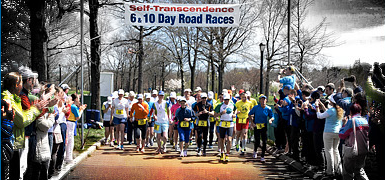The ideal diet for training consists of Carbohydrate 65/70% + Protein 15/20% + Fat 15%. Add to this water, vitamins and minerals and you have the ideal balance to refuel your body and provide you with energy stores that can be released when exercising.
Carbohydrates provide the main source of energy/fuel for marathon runners.
Slow release carbohydrates (Brown rice, wholemeal pasta, potatoes) provide good training and pre-race nourishment. These foods are stored in the body in the form glycogen which fuels your muscles. It is therefore vital that when training heavily these stores of glycogen are kept topped up. Try to eat a carbo snack as soon as possible after running, bananas or a sandwich until you can have a full meal or you will start to feel increasingly fatigued and muscles will get sore, this is when you are at risk of injury or weakening your immune system.
Try whenever possible to have fresh vegetables and never overcook them, so that they contain the vitamins and minerals that you need.
Simple carbohydrates such as confectionary and sweet foods can give a quick boost of energy but will not provide lasting energy so should be used sparingly.
It is important not to neglect breakfast. A good breakfast of complex carbohydrates will give you a great start to the day and if you have had a morning run will restore your energy levels quickly. It is also important to eat regular meals.
For keeping your body well hydrated water is always the best.
You should drink before, during and after exercise, sports drinks are also useful for boosting energy reserves but read the labels before buying, some are full of 'e' numbers and are of no real benefit.
If you feel dizzy, you have left it too late, it is better to drink slightly more water than not enough. Even in cold weather you will lose body fluids when training so be very careful.
Tea and coffee are ok in small quantities but are diuretic, which means they will cause a degree of dehydration, so if you are drink them make sure you compensate by drinking plenty of water during the day.
When using powdered sports drinks practice to get the right concentrate and use them while running, some can cause slight stomach problems so practise ahead of time rather than during the marathon!
Protein does provide an important part of your overall requirements, it will aid energy stores when glycogen stores are depleted, usually after 2 hours plus of exercise. It also helps your body to burn fat, for most of us this will kick-in in the later stages of the marathon.
Generally fried and fatty foods should be avoided but it is important to include essential fatty acids such as olive or flax seed oil in your diet for energy production in the body, for cardiac function, for the health of hair, skin and nails, for hormone production, brain function, and (extremely important) for the integrity of the very structure of our cells.
It can be helpful to keep a record of your food intake alongside your training record it may identify what works well for you.
Key Points
- Carbohydrate high diet
- Plenty of fresh fruit and vegetable
- Drink plenty of water
- Avoid fats where possible
- Odd treats are ok, you deserve them



